When it comes to your health, especially issues related to the urinary system or male reproductive organs, finding a urologist near you is crucial. Urologists are medical specialists who diagnose and treat conditions related to the kidneys, bladder, ureters, urethra, and male reproductive organs. Whether it’s a urinary tract infection (UTI), kidney stones, or erectile dysfunction, a urologist can provide the care you need.

What Does a Urologist Do?
Urologists treat a wide range of conditions, including:
- Urinary tract infections (UTIs)
- Kidney stones
- Bladder issues like incontinence or overactive bladder
- Prostate issues such as benign prostatic hyperplasia (BPH) and prostate cancer
- Male infertility and erectile dysfunction
- Testicular cancer, penile conditions, and other male reproductive health concerns
- Pediatric urology, addressing issues like undescended testicles or hernias
They also manage complications resulting from surgery or trauma affecting the urinary or reproductive systems.
When Should You See a Urologist?
If you experience any of the following symptoms, it may be time to consult a urologist:
- Pain or burning during urination
- Blood in the urine
- Difficulty urinating or changes in urinary frequency
- Lower back, pelvic, or abdominal pain
- Erectile dysfunction or sexual health issues
- Persistent, recurring urinary tract infections
- Infertility concerns
Ignoring these symptoms can lead to more severe health complications, so seeking prompt medical advice is essential for maintaining good health.
How to Find a Urologist Near Me
Finding a trusted urologist near you is easier than you might think. Here’s a step-by-step guide:
1.Online Search Start by searching for “urologist near me” or “urologist in [your city].” This will give you a list of specialists in your area. Be sure to read reviews from previous patients to get an idea of their experience with the doctor. Many review sites, like Healthgrades or Zocdoc, can help you find top-rated urologists and see their appointment availability.
2.Ask for a Referral Your primary care physician (PCP) can be a great resource for recommendations. If your PCP has already assessed your symptoms and thinks you should see a urologist, they can refer you to someone who is highly skilled in the specific area you need.
3.Check Your Health Insurance Network Before making an appointment, ensure the urologist is covered under your insurance plan. This can help you avoid unexpected medical expenses. Most insurance companies have online directories where you can search for in-network urologists.
4.Verify Credentials Ensure the urologist is board-certified, which means they have met the necessary training and testing requirements in their specialty. You can typically verify credentials through state medical boards or online directories.
5.Consider Location and Accessibility While it’s important to find a reputable urologist, consider their office location, appointment availability, and ease of access. If you need frequent visits, choosing someone nearby can make the process more convenient.
What to Expect During Your Visit
When you visit a urologist, they’ll likely begin by discussing your symptoms and medical history. A physical exam may follow, which could include an abdominal or pelvic examination. Depending on your condition, the urologist may recommend tests such as a urinalysis, ultrasound, or other imaging studies to understand the root of your symptoms.
Conclusion
If you’re experiencing urinary or reproductive health concerns, finding the right urologist near you is essential. With the right specialist, you can get the diagnosis and treatment you need to address your health issues and improve your quality of life. Don’t wait — reach out to a urologist today to begin your journey to better health.





.jpeg)
Comments